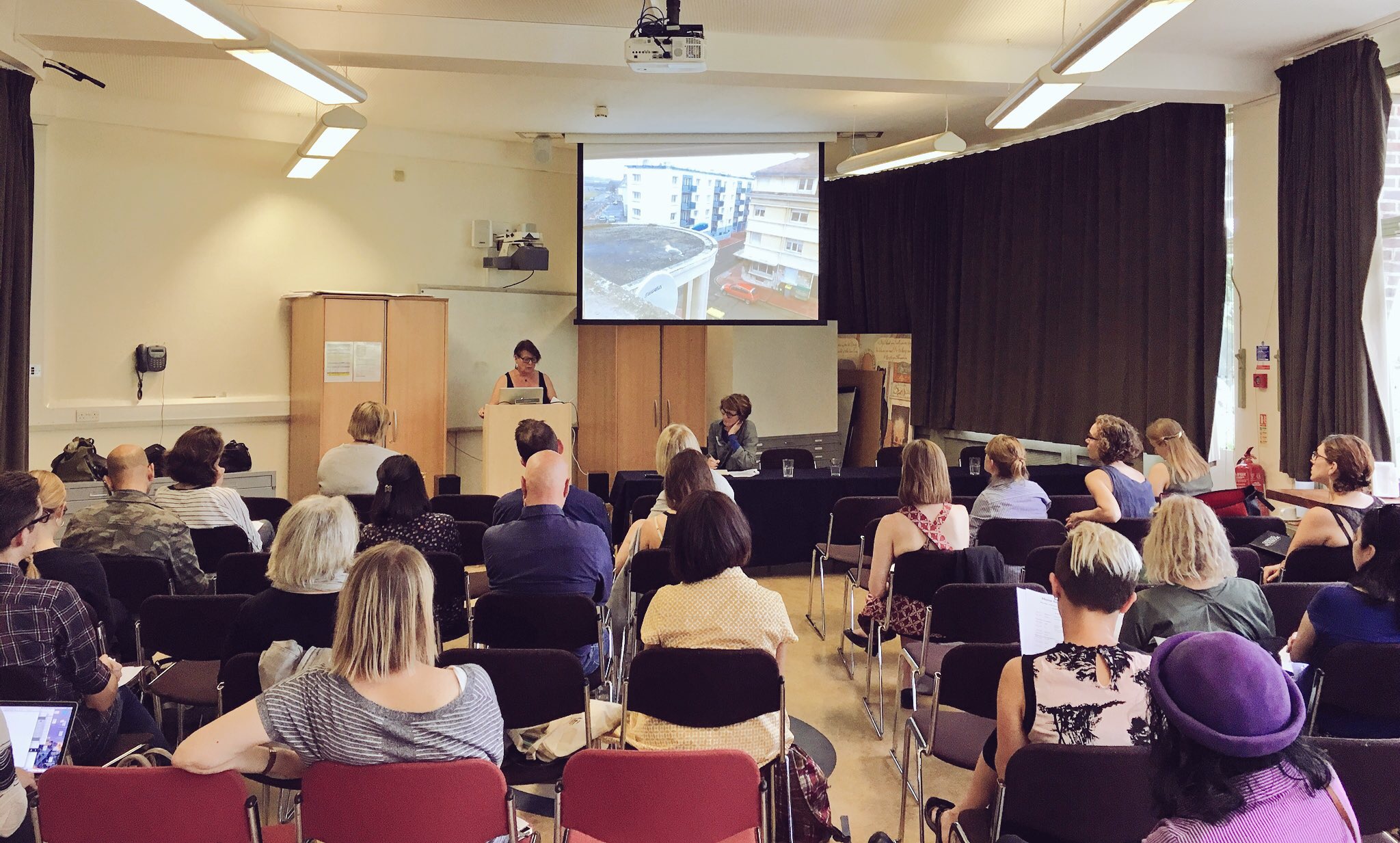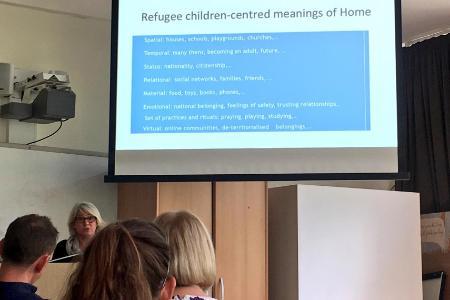Conference: Home for Refugee Children
Half of the world’s 21.3 million refugees are aged under 18 and an increasing number are fleeing their homes alone. In Europe 200,000 unaccompanied minors have applied for asylum since 2008, including 96,000 in 2015 alone (Save the Children, 2016).
Refugee children are seldom given voice and are often depicted in the media as helpless and passive victims. The one-day conference ‘Home for Refugee Children’ at the Geffrye Museum aimed to challenge such representations by bringing together activists, artists and researchers to investigate the uncertainties of relocation and the practical and emotional challenges for children who are displaced from home and move to unfamiliar, insecure and perhaps hostile locations.
 The conference screened eight films, including Sue Clayton’s critically acclaimed documentary ‘Calais Children: A Case to Answer’ and four new films funded by the QMUL CritiQues fund: ‘Fertig’ by Janetka Platun and ‘Child Migrants Welcome?’, ‘Home’ and ‘The House that Is Not There’ by Eithne Nightingale and Mitchell Harris. The conference also hosted five talks, including a keynote given by Professor Giorgia Dona (University of East London), provoking discussion about areas for future research and how collaborations between researchers, artists, activists and museums can influence public debate and improve the lives of refugee children.
The conference screened eight films, including Sue Clayton’s critically acclaimed documentary ‘Calais Children: A Case to Answer’ and four new films funded by the QMUL CritiQues fund: ‘Fertig’ by Janetka Platun and ‘Child Migrants Welcome?’, ‘Home’ and ‘The House that Is Not There’ by Eithne Nightingale and Mitchell Harris. The conference also hosted five talks, including a keynote given by Professor Giorgia Dona (University of East London), provoking discussion about areas for future research and how collaborations between researchers, artists, activists and museums can influence public debate and improve the lives of refugee children.
One of the main themes that emerged was the need for more information and skilled knowledge about the legal process for refugee children. The solicitor Wendy Pettifer spoke about her experiences in working with child migrants in Calais and the challenges facing professionals, activists and children throughout the often long and protracted legal process. The legal issues and barriers were identified across the different conference contributions, as film makers and artists called for more knowledge about the legal process.
 For example, Giorgia Dona explained how state-centred understandings of home do not necessarily map onto refugee children’s experiences of home, revealing the incompatibility of legislation and lived experiences. Sue Clayton further highlighted such problems as she uncovered how aspirational, cross-channel seeking migrants in the Calais Jungle while being placed in France were never considered to be of France. The spaces where migrants temporarily spend time and the often invisible journeys they travel before arriving are not recognised.
For example, Giorgia Dona explained how state-centred understandings of home do not necessarily map onto refugee children’s experiences of home, revealing the incompatibility of legislation and lived experiences. Sue Clayton further highlighted such problems as she uncovered how aspirational, cross-channel seeking migrants in the Calais Jungle while being placed in France were never considered to be of France. The spaces where migrants temporarily spend time and the often invisible journeys they travel before arriving are not recognised.
A second theme that emerged relates to the role that art and film can play in bringing the voices of refugee children to life and healing some of the trauma that most of them suffer. Bobby Lloyd and Naomi Press from Art Refuge UK showcased how their art therapy workshops with children can visualise experiences that are most often unrecognised or hard to describe. Sam Underwood from International Rescue Committee UK similarly spoke of the need to bring the stories to life as he introduced short films made by Syrian refugee girls with Another Kind of Girl collective. The work raised questions about the lived experiences of being a child migrant in camps and how they experience settling into new environments when finding a home—experiences of settling that were similarly raised in Eithne and Mitch’s three films. ‘The House that Is Not There’ was made in collaboration with Gabriela Bran, who had created an animation of her family’s migration history from El Salvador to the UK. Gabriela and her family were all present at the screening. The importance of learning lessons from children who have come to the UK as refugees and made homes was further underlined by Emma Winch who introduced the Hackney Museum’s interesting work with documenting Hackney’s rich history of migration.
The final panel discussion identified key priorities for future work, including the importance of improving knowledge and understanding about legal processes and key areas for collaboration between the UK and France. The Home for Refugee network, funded by CritiQues, will take these ideas forward at its next meeting in October.
A big thank you to all who participated, to the Geffrye Museum for hosting and to QMUL CritiQues for funding the conference. Thanks to Sue Clayton, Wendy Pettifer, Emma Winch, Naomi Press, Bobby Lloyd, Sam Underwood and Another Kind of Girl collective, Janetka Platun, Eithne Nightingale, Mitch Harris, Giorgia Dona, Teresa Hare Duke, Anna-Louise Milne, Alison Blunt, Eleanor John and Kiera Vaclavik. Particular thanks to Casper Laing Ebbensgaard (QMUL) and Danielle Patten (Geffrye Museum) for their work in organizing the conference.


